Dental Hygiene and Cleanings
How important is oral hygiene and professional cleanings? That depends - do you like eating and chewing your favorite foods? - We do too... Do you want to be able to continue eating your favorite foods? - So do we. Do you like smiling? How about not having unnecessary pain and health problems? - We have a lot in common! You get the point we're trying to illustrate: if you answered yes to any of the above questions then oral hygiene is probably pretty important for you. The purpose of a healthy mouth is not simply for the joy of eating our favorite foods - it is a component of our overall health and wellbeing. Please come for your regular scheduled hygiene appointments, exams and practice good oral habits the rest of the time - you'll thank yourself for it, plus it's the most cost effective form of "Dental Insurance" anyone can have.
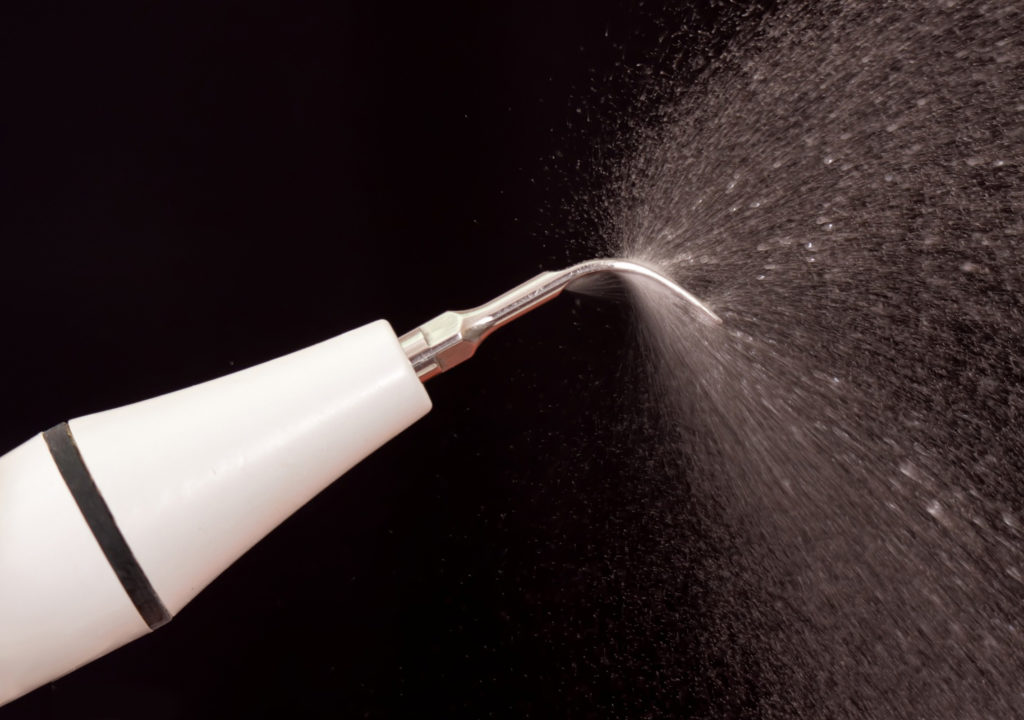

Why we do it: We're sure you've heard throughout your life and from any of your dental visits - brushing and flossing is the main defense against things like cavities and periodontal disease. It's true and we'll never tell you otherwise - but it never hurt anyone to have a refresher course on proper technique. Even though most of us do brush and floss every day, how you do it is just as important as actually doing it. During your hygiene visits, we will take a few moments to review these crucial steps with you. But lets take a minute here to review just why we emphasize brushing, flossing, exams and hygiene appointments so much.
Brushing: Brushing your teeth does many things at the same time besides the obvious of removing food particles: it also cleans and stimulates your gums, keeps your breath minty fresh and removes plaque (see below). However, brushing alone is not good enough to complete the job and call it a day.
Flossing: Flossing does a similar job to brushing in a different manner. While brushing does a good job (if done properly) at removing harmful substances from the surfaces of your teeth, it has a difficult time getting in-between them. This is where flossing comes in and removes the stuff that brushes can't reach. Ideally, you should floss after each time you eat (we know not everyone does that), but you should at the very least do it daily. If you hate the feeling of flossing or have trouble doing it, a floss brush or water pick will do a decent job.
Hygiene & Exam appointments: Even with all of the measures taken above, there will still be areas that get missed: things that do not come off easily, genetic factors and small problems that can be intercepted before they become major ones. That's where we come in: your teeth are your responsibility for 363 days of the year, for the remaining two - let a professional help. At the very LEAST you leave with a better sense of whats going on in your mouth, we can reinforce your home care regimen and have an opportunity to locate areas in the mouth that may need special attention. At these appointments we use instruments most people don't have available to them and can see things you might not. We get patients from all walks of life, even extremely fearful ones, but don't let a hygiene and exam appointment stand in your way of getting a healthy mouth - we won't bite, we promise (pun very much intended). The hygiene and exam appointments are nothing to be fearful of or avoid, they are extremely important. As mentioned, even with routine brushing and flossing, areas of plaque can be missed and it is a snowball effect from there.
PLAQUE & TARTAR
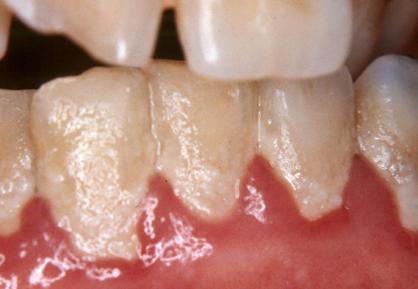
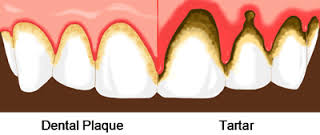
Dental Plaque is a sticky, colorless film of bacteria that constantly forms on everyones' teeth and along the gum line throughout the day. Plaque contains bacteria that causes cavities and gum disease. It is easily removed with brushing and flossing, but it is difficult to see and areas often get missed. This plaque that gets missed, if not removed, will lead to inflammation and irritation of the gums around your teeth, eventually it will turn into Tartar.
Dental Tartar (Calculus) is plaque that has become a calcified and hardened mineral buildup on your teeth. If left untreated, the initial problem starts to compound as tartar gives plaque a better, stickier surface on which to grow. As the condition worsens problems such as cavities and gum disease (periodontitis) develop leading to the eventual loss of teeth and potentially even very serious non-dental related health problems. It's fairly easy to see if it is above the gum line, tartar is very porous and absorbs stains easily, usually appearing as a yellow, brown or chalky deposit on the teeth, at or below the gum line. Tartar can not be removed with brushing alone, only a Dentist or Hygienist can remove it - this is done at your recommended professional cleanings every 6 months. The process of removing tartar is called scaling. At Old Hook Dental, we use a special ultrasonic scaler that gently breaks up the tartar using sound wave vibrations and flush it away with water. As you can see in the bottom left picture, once the tartar has been removed the gums underneath are very inflamed and have receded. 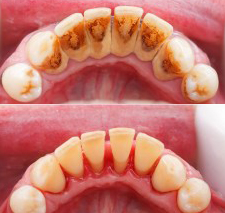
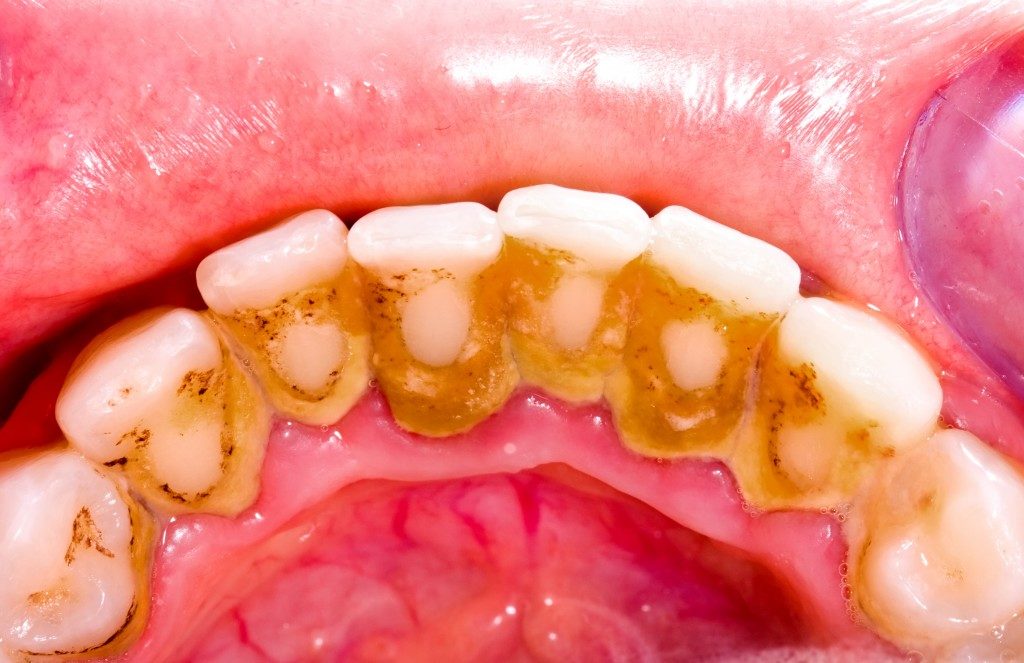
As you can see, this is why we always advocate proper brushing, flossing and routine hygiene / checkup appointments. It's easier, cheaper and way less stressful to prevent problems than it is to treat them.
During a hygiene appointment at Old Hook Dental, you’ll receive preventive, diagnostic and educational services.
Preventive : Hygiene
- Removal of plaque and tartar
- Stain removal
- Polishing of teeth to create a smooth surface
- Fluoride application (if necessary)
- Sealants (for children and young adults)
Diagnostic : Exam
- Reviewing and updating medical history
- Oral cancer screening
- Digital X-rays of teeth
- Examination of teeth to detect decay
- Evaluation of gum, oral tissues and structures
Educational : Home care
- Tooth brushing and flossing instruction
- Dietary counseling (if needed)
- Recommendations for future treatment
- Evaluation of self-care effectiveness
- Tobacco-cessation counseling (if needed)
- Follow-up hygiene appointment